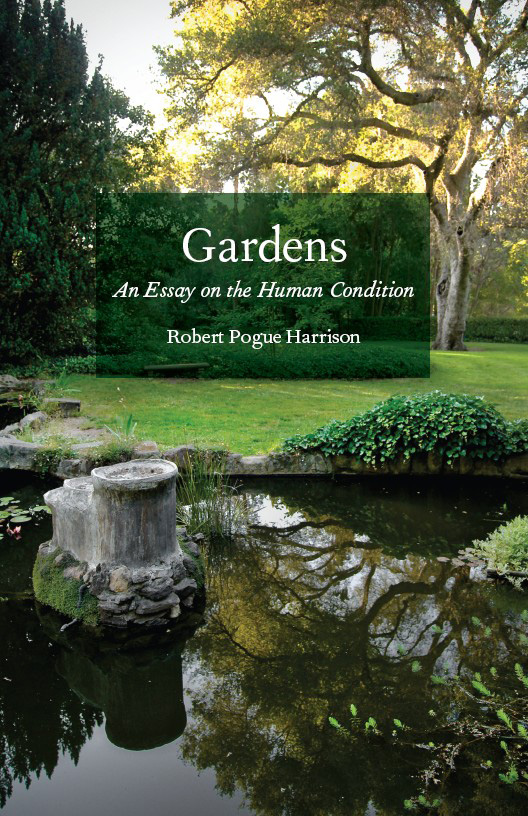Gardens AN ESSAY ON THE HUMAN CONDITION By ROBERT POGUE HARRISON 2008《 花園:談人之為人》2011:其中史坦佛大學的兩座花園說起:Kingscote Gardens 及Papua New Guinea Sculpture Garden
https://www.facebook.com/hanching.chung/videos/4409455612398545
Gabrielle van Zuylen《 世界花園》台北:時報文化,1998 中的" 世界"
Tous les jardins du monde (DECOUVERTES GALLIMARD) (French) Mass Market Paperback – 22 4 月 1994作者 Gabrielle Van Zuylen

Gardens AN ESSAY ON THE HUMAN CONDITION By ROBERT POGUE HARRISON, 2008
中文本 《 花園:談人之為人》蘇薇星譯,北京:三聯,2011
Gardens
AN ESSAY ON THE HUMAN CONDITION
Humans have long turned to gardens—both real and imaginary—for sanctuary from the frenzy and tumult that surrounds them. Those gardens may be as far away from everyday reality as Gilgamesh’s garden of the gods or as near as our own backyard, but in their very conception and the marks they bear of human care and cultivation, gardens stand as restorative, nourishing, necessary havens.
With Gardens, Robert Pogue Harrison graces readers with a thoughtful, wide-ranging examination of the many ways gardens evoke the human condition. Moving from from the gardens of ancient philosophers to the gardens of homeless people in contemporary New York, he shows how, again and again, the garden has served as a check against the destruction and losses of history. The ancients, explains Harrison, viewed gardens as both a model and a location for the laborious self-cultivation and self-improvement that are essential to serenity and enlightenment, an association that has continued throughout the ages. The Bible and Qur’an; Plato’s Academy and Epicurus’s Garden School; Zen rock and Islamic carpet gardens; Boccaccio, Rihaku, Capek, Cao Xueqin, Italo Calvino, Ariosto, Michel Tournier, and Hannah Arendt—all come into play as this work explores the ways in which the concept and reality of the garden has informed human thinking about mortality, order, and power.
Alive with the echoes and arguments of Western thought, Gardens is a fitting continuation of the intellectual journeys of Harrison’s earlier classics, Forests and The Dominion of the Dead. Voltaire famously urged us to cultivate our gardens; with this compelling volume, Robert Pogue Harrison reminds us of the nature of that responsibility—and its enduring importance to humanity.
"I find myself completely besotted by a new book titled Gardens: An Essay on the Human Condition, by Robert Pogue Harrison. The author . . . is one of the very best cultural critics at work today. He is a man of deep learning, immense generosity of spirit, passionate curiosity and manifold rhetorical gifts."—Julia Keller, Chicago Tribune
"This book is about gardens as a metaphor for the human condition. . . . Harrison draws freely and with brilliance from 5,000 years of Western literature and criticism, including works on philosophy and garden history. . . . He is a careful as well as an inspiring scholar."—Tom Turner, Times Higher Education
"When I was a student, my Cambridge supervisor said, in the Olympian tone characteristic of his kind, that the only living literary critics for whom he would sell his shirt were William Empson and G. Wilson Knight. Having spent the subsequent 30 years in the febrile world of academic Lit. Crit. . . . I’m not sure that I’d sell my shirt for any living critic. But if there had to be one, it would unquestionably be Robert Pogue Harrison, whose study Forests: The Shadow of Civilization, published in 1992, has the true quality of literature, not of criticism—it stays with you, like an amiable ghost, long after you read it.
“Though more modest in scope, this new book is similarly destined to become a classic. It has two principal heroes: the ancient philosopher Epicurus . . . and the wonderfully witty Czech writer Karel Capek, apropos of whom it is remarked that, whereas most people believe gardening to be a subset of life, ‘gardeners, including Capek, understand that life is a subset of gardening.’”—Jonathan Bate, The Spectator
Acknowledgments
1 The Vocation of Care
2 Eve
3 The Human Gardener
4 Homeless Gardens
5 “Mon jardin à moi”
6 Academos
7 The Garden School of Epicurus
8 Boccaccio’s Garden Stories
9 Monastic, Republican, and Princely Gardens
10 A Note on Versailles
11 On the Lost Art of Seeing
12 Sympathetic Miracles
13 The Paradise Divide: Islam and Christianity
14 Men Not Destroyers
Epilogue
Appendixes
1 From The Decameron, Giovanni Boccaccio
2 From Mr. Palomar, Italo Calvino
3 “The Garden,” Andrew Marvell
4 A Note on Islamic Carpet Gardens
Notes
Works Cited
Index


沒有留言:
張貼留言